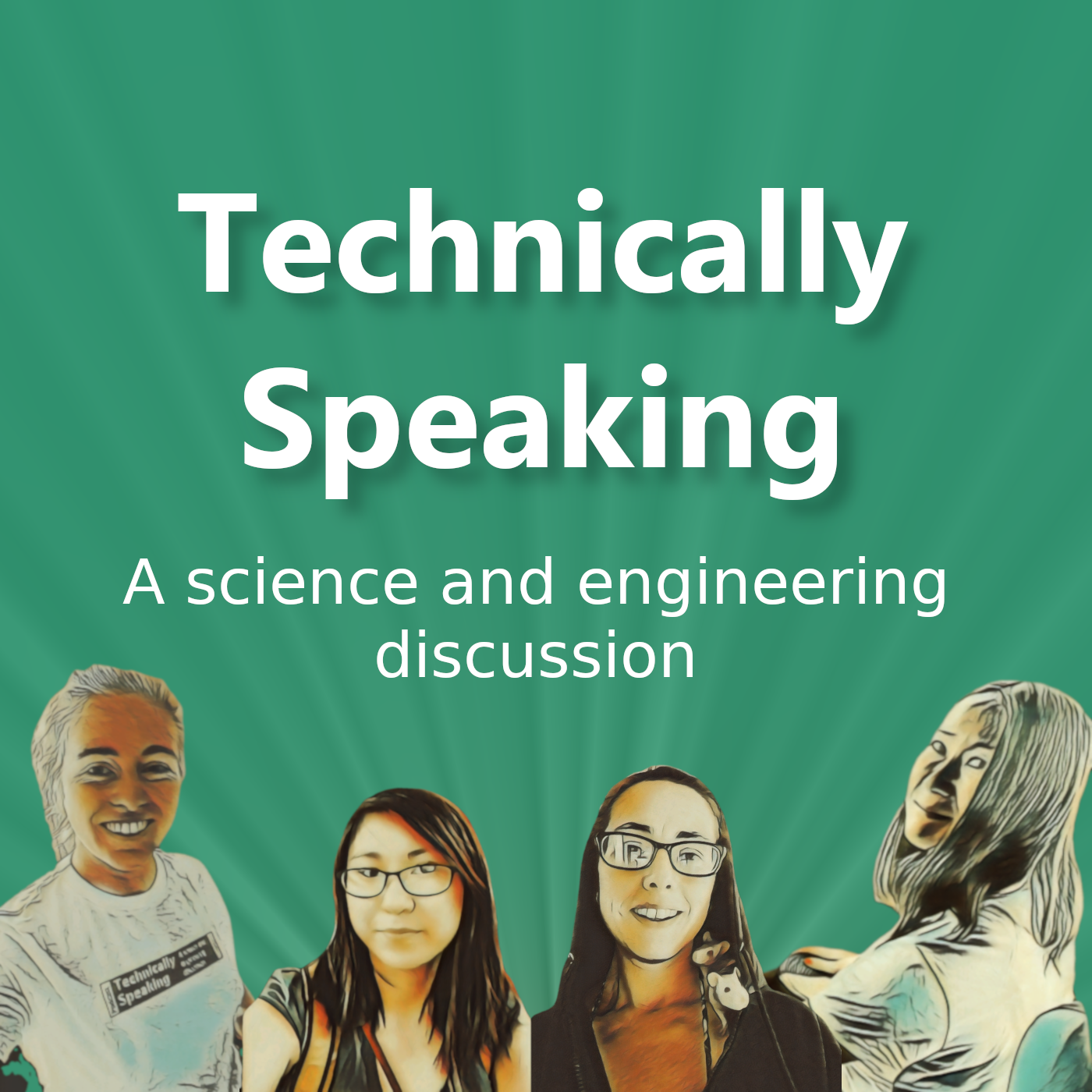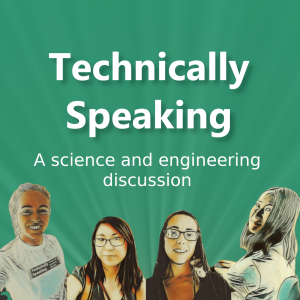

15.1K
Downloads
112
Episodes
Dive deep into the world of science and engineering with engaging discussions and thought provoking debates. The team share insights from careers in science and engineering, combining expert knowledge and scientific thinking with a touch of humour to make even the most complex topics accessible and entertaining for both enthusiasts and casual listeners. Sometimes we’re funny, often we’re opinionated, always we’re entertaining. Support us: https://ko-fi.com/techspeak_podcast X/Twitter: @TechnicallySp11 Instagram: technicallyspeaking.podcast Reddit: techspeak_podcast Email: techspeak.podcast@gmail.com
Episodes

7 days ago
7 days ago
It’s due to be retired on 2030 when it will crash back to Earth so was it worth it? Ellie, Antonia and Laura look at just some of the scientific discoveries it’s helped with, including the many processes involved in ageing, getting a clearer understanding of how plaques form in the brain, the fundamental physics of water boiling and some nifty science of scent molecules.
Fact check:
- Cost of keeping the ISS alive
- Low gravity water boiling
- The NPR article Laura mentioned which gives an overview of the ISS
- Research using bed rest as an alternative to microgravity
- Research using random orientation machines to simulate microgravity
- Research proposed by the Japan Aerospace Exploration Agency to look at a straightforward partial explanation of how bone and muscle loss accelerates ageing
- A study that mentions cells respond to mechanical forces
- NASA’s 20 breakthroughs, which mentions research in to plaques that form in the brain

Thursday Jun 19, 2025
How do gut microbes affect our behaviour?
Thursday Jun 19, 2025
Thursday Jun 19, 2025
New research has found a startling link between types of bacteria that live in our gut and whether we become addicted to food. Laura, Jasmin and Emma discuss this, wonder about the connection between the gut and the brain which seems to provide two way communication, and speculate about the challenges of doing this research as well as what the future might hold.
Fact check:
- The research that shows the correlation between gut microbe communities and addiction
- A quick summary of some ways the gut and brain communicate
- The gut-brain connection and some clinical trials that have shown probiotics can affect your mood
- How your immune system is involved

Thursday Jun 05, 2025
Remember when we all had a particle accelerator in our homes?
Thursday Jun 05, 2025
Thursday Jun 05, 2025
Tech has advanced rapidly and the future hold exciting possibilities, even some of the stuff that’s now obsolete was pretty nifty. Ellie, Laura and Antonia start off by looking at cathode ray tubes, which are a pretty old way of generating moving pictures. They also look at the large hadron collider and consider what sort of technology we might have in the future, whether that is teleportation or autonomous plants.
Fact check:

Thursday May 22, 2025
How do you make T-rex leather?
Thursday May 22, 2025
Thursday May 22, 2025
Why would you do it and how does it compare to other alternatives to cow hide? Ellie, Laura and Antonia look at the process of growing skin in the lab to turn in to leather, so-called vegan alternatives, and what animal skins you can make leather from. They also consider ethics and sustainability. Are we better off continuing to make leather from livestock or should humanity pursue alternatives?
Fact check:
- News about making T-rex leather because the collagen has endured for millions of years
- A scientific journal review article about lab-grown leather
- Vegan alternatives to leather
- A journal article comparing the properties of alternatives to traditional leather
- Leather as a by-product of the meat industry
- Sustainable leather made from invasive fish
- Historic walrus leather boats

Thursday May 08, 2025
Technical short: cow gut microbiome
Thursday May 08, 2025
Thursday May 08, 2025
Taking a deeper dive into the biology behind how cows produce methane, and the two methods being researched to reduce production. Jasmin and Laura discuss feed additives, the importance of hydrogen and the various ways it can be used to make things that aren't methane. They also review some genetics research that focusses on the microbiome and how hereditable traits of the cow can influence it. They draw on experience of chemical engineering to consider how the microbiome can be optimised for energy production in the same way that you'd optimise an anaerobic digestion plant.
Fact check:
- An overview of the main biochemical pathways in the microbiome
- Research into how to optimise the microbiome to utilise food more efficiently
- Research showing that using a food suppliment that includes 3-NOP and fumarate is beneficial in reducing methane emissions
- A quick summary of one research group's take on probiotics and why they're developing sensors to go inside a cow
- Researchers in Scotland look at genetics of the microbiome to understand how its affected by the cow's own genetics

Thursday Apr 24, 2025
How much physics is there in engineering?
Thursday Apr 24, 2025
Thursday Apr 24, 2025
With an audience from the Engineering Development Trust’s virtual routes to STEM course, Laura, Emma, Antonia and Rwayda talk about their diverse careers in physics and engineering to find common ground. They talk about how they chose what to study at university and provide details on what some engineers do beyond applying scientific principles to solve a challenge.
Emma talks about how a degree in physics led her to study a doctorate in DNA and cancer, Antonia explains how chemical engineering led her to help companies make more sustainable energy choices and Rwayda talks about how a desire to build things led her to become a university lecturer in civil engineering. Laura talks about her varied career path that partly involved studying physics, becoming a nuclear scientist, working with engineers, supervising project management students in a civil engineering department at university, and working as a science communications specialist.

Thursday Apr 10, 2025
Should cows produce less methane?
Thursday Apr 10, 2025
Thursday Apr 10, 2025
Methane is a potent greenhouse gas which contributes to the climate emergency. Intensive farming can lead to cows contributing significantly to levels of this gas in the atmosphere. Antonia, Ellie and Jasmin discuss the latest research to reduce the amount of methane cows produce through burps and flatulence. They look at additives to cow feed, using seaweed as an alternative feed, and selectively breeding the cows. They consider whether people should eat less meat and look at cultural and geographical challenges to doing so.
Fact check:
- Estimates of greenhouse gas emissions from livestock vary
- The Intergovernmental Panel on Climate Change shows that methane has 81 times the global warming potential of carbon dioxide
- Here’s how cows produce methane as part of their digestion
- News about the Bovaera additive produced by Arla
- News about Hilda the cow, selectively bred over 16 generations to produce less methane
- Denmark’s plan to introduce a tax for cows
- The article Ellie mentions in The Conversation

Wednesday Mar 26, 2025
What’s the latest research into recycling clothing?
Wednesday Mar 26, 2025
Wednesday Mar 26, 2025
Most clothes are made of a mix of natural and synthetic fibres which makes them difficult to recycle back into clothing once they’re worn out. Antonia and Laura discuss an exciting new research project that has separated four different types of fibre from a single scrap of cloth using microwaves. They compare this to an alternative method which uses enzymes found in bacteria to recycle polyester and consider what these efforts might mean for a future circular economy where clothing is infinitely recyclable. Will we ditch cotton and start wearing completely synthetic fibres?
Fact check:
- Research using microwaves, and a news article about it
- The latest news on using enzymes to break down polyester (PET).
- A perspective on using enzymes to recycle PET, published in a biochemistry journal
- The pilot plant operated by Carbios, that Antonia mentions
- News about mountains of clothing waste in the Atacama Desert

Thursday Mar 13, 2025
How do you build a tunnel underwater?
Thursday Mar 13, 2025
Thursday Mar 13, 2025
And what does it take to win an award for it? Ellie, Rwayda and Laura discuss the Dalian Bay Undersea Tunnel in China which won Global Project of the Year 2024 for its novel construction methods and use of first-of-a-kind technologies, including floating giant concrete tubes into the bay to submerge and then connect them, an on-site laboratory so that experiments can inform the construction, and use of sensors in the specially developed cement which is designed to last an impressive 100 years in the frigid water of the bay.
References:
- Read about why it was awarded Global Project of the Year in Engineering News-Record
- News coverage on chinadaily.com
- More news coverage at ctgn.com
- A journal article about testing the special design of cement which used the manufactured sand

Thursday Feb 27, 2025
Why are things like crab blood and scorpion venom so valuable?
Thursday Feb 27, 2025
Thursday Feb 27, 2025
Science is always finding new ways to harness nature. Antonia, Ellie and Laura discuss what the blood from a certain type of sea creature is used for, and how scorpion venom is being studied for a whole host of medical research. They also look at Pangolin scales used to treat some ailments and a giant tuna which sold for a small fortune, but might not necessarily be worth their price tag.
Fact check:
- The cost of crab blood
- The news article from NPR about crab blood
- Facts about bacterial toxins
- News about scorpion venom
- More news about scorpion venom
- The journal article explaining the many potential uses of scorpion venom
- Pangolin scales in the news
- Some behavioural science used by the UK Government communications service to help change behaviours, which underscores Antonia and Laura's perspectives
- Possibly the world's most expensive tuna